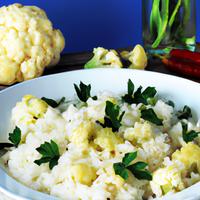
1 serving (85 grams) contains 25 calories, 2.0 grams of protein, 0.3 grams of fat, and 5.0 grams of carbohydrates.

Log this food in SnapCalorie

Nutrition Information
Calories |
69.4 | ||
|---|---|---|---|
% Daily Value* |
|||
| Total Fat | 0.8 g | 1% | |
| Saturated Fat | 0 g | 0% | |
| Polyunsaturated Fat | 0 g | ||
| Cholesterol | 0 mg | 0% | |
| Sodium | 83.3 mg | 3% | |
| Total Carbohydrates | 13.9 g | 5% | |
| Dietary Fiber | 5.6 g | 20% | |
| Sugars | 5.6 g | ||
| protein | 5.6 g | 11% | |
| Vitamin D | 0 mcg | 0% | |
| Calcium | 61.1 mg | 4% | |
| Iron | 1.1 mg | 6% | |
| Potassium | 888.9 mg | 18% | |
* Percent Daily Values are based on a 2,000 calorie diet. Your daily values may be higher or lower depending on your calorie needs.
Food Attributes
Source of Calories
About Riced cauli
Riced cauliflower is made by finely chopping or grating fresh cauliflower into small, rice-sized pieces, offering a versatile, low-calorie alternative to traditional grains. This nutrient-packed vegetable originates from the cruciferous family and is commonly used in cuisines worldwide, including Mediterranean, Indian, and American dishes. Rich in vitamins C, K, and B6, as well as fiber and antioxidants, riced cauliflower supports digestion, strengthens immunity, and promotes healthy bones. It is naturally low in calories and carbs, making it a popular choice for those following keto, paleo, or gluten-free diets. However, its low protein content means it’s best paired with other protein-rich foods for balanced meals. Easy to cook and adaptable to flavors, riced cauliflower can be stir-fried, baked, or steamed, making it an ideal ingredient for health-conscious meals without sacrificing taste.



